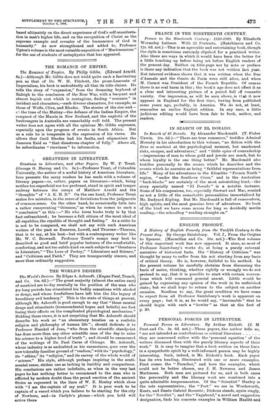THE WORLD'S DESIRES.
The World's Desires. By Edgar A. Ashcroft. (Kagan Paul, Trench and Co. 10s. 6d.)—" The great majority (almost the entire race) of mankind are to-day mentally in the position of the man who for long periods has stimulated his bodily sensations with alcohol or drugs, and whose forefathers have left him the like legacy of hereditary evil tendency?' This is the state of things at present, although Mr. Ashcroft is good enough to say that "these mental drugs and stimulants (transcendental hopes and beliefs) are fast losing their effects on the complicated physiological mechanism." Holding these views, it is not surprising that Mr. Ashcroft should describe his work as "an elementary treatise on a realistic religion and philosophy of human life " ; should dedicate it to Professor Haeckel of Jena, "who from the scientific standpoint has done more than any other scientific man of the day to raise his science to a higher level of truth "; and should be enamoured of the writings of Dr. Paul Carus of Chicago. Mr. Ashcroft, whose industry is as undoubted as his earnestness, goes over the now tolerably familiar ground of "realism," with its "psychology," its "ethics," its "religion," and its survey of the whole world of
science." His style, although perhaps inspiring in the senti- mental sense, strikes one as lacking in lucidity and compactness. His conclusions are rather indefinite, as when in the very last pages he has nothing better to recominend to the man who is afflicted by modern doubt than the proud emotion of the ancient Stoics as expressed in the lines of W. E. Henley which close with "I am the captain of my soul." It is poor work to be captain of a vessel which you believe to be starting for the city of Nowhere, and—in Carlyle's phrase—which you hold will arrive there






























































 Previous page
Previous page